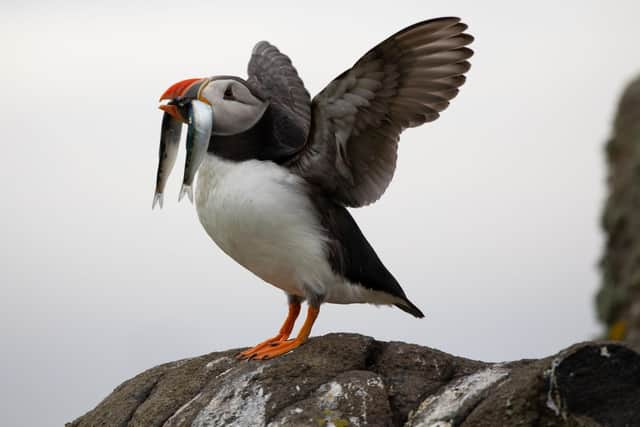Scotland to ban commercial sandeel fishing in bid to boost threatened seabirds, including puffins, and other marine wildlife
The move is aimed at safeguarding stocks of the tiny fish, which play a key role in the marine food chain – supporting other fish as well as seabirds, seals, whales and dolphins.
The announcement, which follows a public consultation on the proposal, comes on the same day as the UK government said it would impose a similar ban in England’s North Sea waters.
Advertisement
Hide AdAdvertisement
Hide AdThe legislation will be laid at Holyrood on Monday, with the ban coming into force on March 26 if passed – ahead of the 2024 fishing season.
Sandeels were once abundant in UK waters, but populations have suffered severe declines in recent years, thought to be caused by a combination of overfishing and the effects of climate change.
Commercial fishing for the catch is carried out solely by European vessels – largely from Denmark – with the fish targeted for their oil and use in animal feed and fertiliser. In recognition of the importance of the species to marine biodiversity, no fishing quota has been allocated to UK vessels since 2021.


Scottish rural affairs secretary Mairi Gougeon said: “Sandeel are a vital part of our marine eco-system and a critical component of the food chain in the North Atlantic. It is critical that we manage our marine environment in such a way as to ensure its sustainable use, protecting biodiversity and ensuring healthy functioning eco-systems.
“Prohibiting all vessels from fishing for sandeel in Scottish waters will help provide long-term sustainability and benefits not just for sandeel, but also for seabirds, marine mammals and other fish species.
“This decision reflects overwhelming support for our proposals, the scientific evidence base and our long-standing position not to support fishing for sandeel, as set out in Scotland’s Future Fisheries Management Strategy.”
A massive 97 per cent of those who responded to the consultation backed ending sandeel fishing.
The ban has been welcomed by environmental groups, including the RSPB, which has been campaigning for such a move for around 25 years in a bid to help threatened seabirds such as puffins and kittiwakes.
Advertisement
Hide AdAdvertisement
Hide Ad“With over 70 per cent of Scottish seabird populations in decline, ending industrial sandeel fishing is the single greatest action that can be taken to support our most vulnerable seabirds right now,” said RSPB Scotland director Anne McCall.
“It will build their resilience in the face of avian flu and the multitude of other human-made pressures they face, such as climate change and offshore developments.
“Sandeels are a key food source for seabirds and other marine wildlife, but have been adversely affected by both climate change and unsustainable fishing. So this is a very positive and welcome measure for the overall health of our seas.”
Underwater robots deployed in pioneering study of Scotland's coastal waters to assess fishing impact
Scotland is a globally important stronghold for seabirds, but many species have been dwindling in recent decades, some dramatically.
Scottish Greens MSP Ariane Burgess, spokesperson for coastal communities, said: “This is a huge boost for our seas and a proud day for Scotland’s puffins, kittiwakes and other ironic seabirds. Sandeels are a vital life source for the seabirds who depend on them, and this will ensure a far greater and more sustainable supply in the future while better protecting our marine environment.”
Comments
Want to join the conversation? Please or to comment on this article.